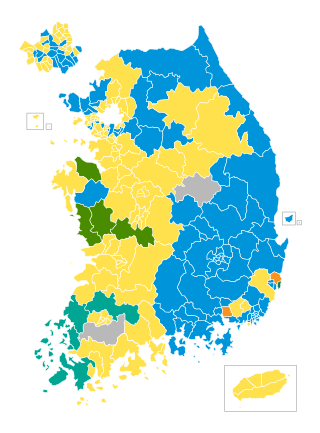Top Qs
Timeline
Chat
Perspective
2004 South Korean legislative election
From Wikipedia, the free encyclopedia
Remove ads
Legislative elections were held in South Korea on 15 April 2004. In the 17th election for the National Assembly, voters elected 299 members of the legislature. The newly formed Uri Party and other parties supporting President Roh Moo-hyun, who was impeached by the outgoing National Assembly, won a majority of seats.[1] This was the first time a centre-left liberal party won a majority in the National Assembly since 1960.
This article needs additional citations for verification. (June 2025) |
Remove ads
Electoral system
The election was held under parallel voting, with 243 members elected in single-member constituencies via first-past-the-post voting and the remainder elected via proportional representation. Proportional seats were only available to parties which won three percent of the national valid vote among seat-allocated parties and/or won five or more constituency seats.
Remove ads
Political parties
Summarize
Perspective
The newly formed liberal Uri Party (Uri-dang or Our Party) gained support through its opposition to the impeachment of President Roh. It won 32 out of 49 seats in Seoul, 44 out of 62 in Incheon and Gyeonggi, confirming that a majority of voters supported the President Roh.
The conservative Grand National Party, which supported the impeachment of President Roh, suffered a loss of support, but won a majority in North Gyeongsang and South Gyeongsang regions and retained the 100 seats necessary to block constitutional changes.
The progressive, socialist Democratic Labor Party got 13.03% of vote share, but won only 10 out of 299 seats due to the FPTP system. However this was considered as a great triumph within political landscape of South Korea which is traditionally anti-communist and against left-wing policies. DLP also won two FPTP seats in Ulsan and Changwon based on labor movement.
The Millennium Democratic Party, formerly the major liberal party, was the second-largest party prior to the election but sustained the biggest loss in the backlash following its leading role in the impeachment of Roh, as much of its support shifted to the Uri Party.
The United Liberal Democrats, a conservative regional party based on North Chungcheong and South Chungcheong regions, lost support since its leader, Kim Jong-pil, did not contest the last presidential election.
Remove ads
Results
By city/province
Remove ads
Notes
References
Wikiwand - on
Seamless Wikipedia browsing. On steroids.
Remove ads




